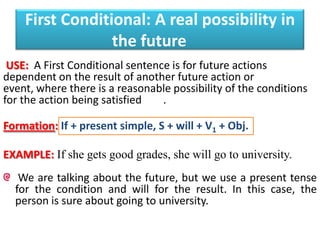Conditionals of English
- 1. LECTURER: UCH BUNCHHIENG TOPIC: CONDITIONAL OF ENGLISH Name: ID: SIN ROTHA 20112869 SANG SELA 20113369 SANG CHHANAK 20111184 POV LIMENG 20113620 PERN VIREAK 20111685
- 2. Zero Conditional: Certainty USE: The Zero conditional is used for things that are always true as long as the condition is met. Formation: if + present simple, + present simple Example: âĒ If you heat water to 100 degrees Celsius, it boils. âĒ If I drink coffee, I get headache. NOTE: In these examples, the result will always occur if the condition is met, so the time is not important.
- 3. First Conditional: A real possibility in the future USE: A First Conditional sentence is for future actions dependent on the result of another future action or event, where there is a reasonable possibility of the conditions for the action being satisfied . Formation: If + present simple, S + will + V1 + Obj. EXAMPLE: If she gets good grades, she will go to university. We are talking about the future, but we use a present tense for the condition and will for the result. In this case, the person is sure about going to university.
- 4. Notice We can use other modal verbs in the result part of the sentence. For example IF Condition Result Possibility If she gets good grades, She will go to university. If the condition is met, then she definitely will go If he gets good grades, He may go to university. He is not sure about going to university. If she gets good grades, She should go to The speaker is expressing university. his or her opinion, giving advice. If he gets good grades, He can go to university. This means that it is possible. If she gets good grades, She could go to This means that it is university. possible, but not that likely. If he gets good grades, He might go to This means that it is university. possible, but not that likely.
- 5. Negative Form: If + present simple, S + will + not + V1 + Obj. Example: If you love her, you will not happy everyday He will not get something if he play card. Question Form: If+ present simple, will + S + V1 + Obj. For question form: it can be used with Wh-question: âWhat, where, when, how, .âĶ.â Example: If you go to visit Angkor Wat, what will you see? If he need to do homework, when will he do? Notice We can also use different present forms in the condition part of the sentence like present simple, present progressive, present perfect, etc.
- 6. Second Conditional: Imaginary Present or Unlikely Future USE: The Second Conditional can be used to talk about imaginary present situations, where we are imagining something different from what is really the case. We can also use it to talk about things in the future that are unlikely to happen, as the condition is unlikely to be met. âĒ We use the past tense in the condition part and would for the result part. Formation: If + past simple, S + would + base form
- 7. For Example: A Condition Time Result Possibility past simple Present WOULD + base Impossible verb If I had the time, I would learn I don't have the Italian. time, so I'm not going to learn Italian. past simple Future WOULD + base Unlikely verb If I won the lottery I would travel There's a very around the small chance of world. winning the lottery, so the trip is unlikely
- 8. We can use other modal verbs in the past tense in the result part of the sentence: IF Condition Result Certainty past simple WOULD + base verb If I had the time, I would learn Italian. Although unlikely to happen, the speaker is sure that they would do it given the opportunity. If I had more time, I might learn English. Although unlikely to happen, it is only a possibility anyway. If I had more time, I should learn some more Although unlikely to about IT. happen, the speaker is saying that it would be a good idea, but is not committed to it. If I had more time I could learn Thailand. Although unlikely to happen, it is only a possibility anyway.
- 9. Negative Form: If + past simple, S + would + not + V1 + Obj. Example: If you went to sleep early, you would not look sleepy now. He would not spend too much for clothes If he were Robben. Question Form: If + past simple, would + S + V1 + Obj.? Notice : We can use WH word in to the question sentence. Example: âĒ If I gave you a lot of money, what would you do? âĒ If you were the government, what would you do to solve traffic congestion in our country?
- 10. Third Conditional: Imaginary Past The third conditional is used when we are talking about the past and imagining something different from what actually happened, that means for imaginary past actions, where the conditions for the action WERE NOT satisfied. Formation: if + past perfect, S+ would have + past participle example: âĒ If I had known, I would have helped. I didn't know and didn't help. âĒ Notice We can use other modal verbs in the result part of the sentence. For example :
- 11. IF Condition Result Certainty past perfect WOULD HAVE+ past participle If I had known, I would have helped. Although this didn't happen, the speaker is sure about the result. If I had known, I could have helped. Although this didn't happen, the result is only a possibility. If I had known, I might have helped. Although this didn't happen, the result is only a possibility. If you had known, You should have helped. Although this didn't happen, it is only a good suggestion or piece of advice. Negative Form: If +past perfect, S + would not + have + V3 + Obj. Example: If you had gone to my party, you wouldnât have seen me.
- 12. Question Form: If +past perfect, would have + S+V3+ Obj.? Notice : We can use WH word in to the question sentence. Example: If she had gone to your party, what would have she seen? Mixed Conditionals Third Second Mixed Conditionals Use: For imaginary present actions or situations that are not possible because the necessary conditions were not met in the past. Formation : if + past perfect, S+ would + base form For example: If you had taken the course, you would know about it.
- 13. (The conditions were not met because the person did not do the course and as a result does not know about it now.) Second Third Mixed Conditionals Use: To avoid the illogicality of saying 'If I had been you', which means that I was not you on that occasion, but could be in the future, which is, of course, impossible. Formation: if + past simple , S + would have + past participle For example: If you went to visit somewhere, you would have done all your works. Formation: if + past simple, S+ would not +have + past participle For example: If I were you, I wouldn't have done that.













